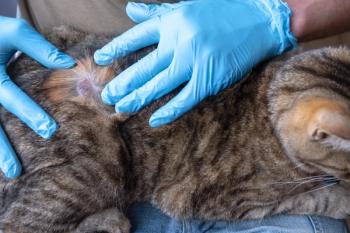
Going green or seeing red?
The inconvenient truth isn't just a documentary about climate change. It's also the reality that many states and local governments are cracking down to protect their environmental well-being while their targets might not even know they are doing anything wrong.
National Report — The inconvenient truth isn't just a documentary about climate change. It's also the reality that many states and local governments are cracking down to protect their environmental well-being while their targets might not even know they are doing anything wrong.
Colorado reportedly is tightening its regulation of veterinary waste practices, and June's issue of DVM Newsmagazine told the story of Massachusetts veterinarian Hazel Holman, who racked up thousands of dollars in environmental fines after a state inspection flagged a number of compliance issues she wasn't even aware of.
Medical-waste laws can be tricky to decipher, and the green movement isn't helping. More states and local politicians are pursuing new regulations as they try to keep their jurisdictions ecologically healthy. It's not a bad thing, but resources detailing what new regulations are passed and how they affect individual practices are few and far between.
"[The information] is out there, but it really can be a struggle to find it," says Chris Copeland, Texas Veterinary Medical Association (TVMA) General Counsel. "The environmental things can have a major impact on the profession with regulations and fines. You really have to be careful to be sure you're giving your members the best advice you possibly can."
A general environmental guide would be helpful, even if it includes practices not required in a particular state, Copeland says, adding the TVMA isn't the only group trying to grasp the ever-changing laws.
"With the green movement, I think there's just that much more attention being paid to disposal of animal remains, medical waste, that sort of thing," Copeland says. "We've actually gotten calls from waste-disposal companies because they aren't always completely aware of what to do with waste from animal hospitals. It's not just the veterinary profession; I think there's some confusion among those whose job it is [to handle the waste]."
None of the state government offices and only a few of the state veterinary medical associations contacted for this report were able to list what resources they offer to veterinary practices about environmental laws.
Some promised to send materials that never arrived, while others made vague references to regulations enforced by the Occupational Safety and Health Administration (OSHA) and Environmental Protection Agency (EPA) guidelines, but the EPA says most medical waste regulation is left up to individual states.
A search of state legislative records also turned up little, as references to veterinary practices often are buried in expansive environmental acts.
Several state veterinary associations said they include any information they find about any new laws or regulations, including those dealing with the environment or medical waste, in their newsletters. But those, like Copeland, looking for one resource with easily accessed information will be disappointed.
So what is a veterinarian with his or her eye on the environment to do?
Keep checking local updates is the best advice anyone could offer.
The American Veterinary Medical Association (AVMA) has a committee set up specifically to deal with environmental issues, but some of the people who have been involved with the committee say it's hard to get interest or support.
"It's a really good group, and it needs to be praised [but] it's not utilized as much as I think it should be," says Dr. Gwen Griffith, a DVM turned full-time conservationist and one of the founding members of the AVMA's Committee on Environmental Issues (CEI).
Griffith serves on the board of the Alliance of Veterinarians for the Environment and gives presentations about the environment, previously for the AVMA and most recently at the American Animal Hospital Association's (AAHA) annual conference. She urges veterinarians during her presentations to be proactive in finding out what they can do to become better global stewards.
"Whenever I talk to practitioners, I encourage them to get their local VMA to have an environmental committee. ... They can be tremendously helpful," she says, adding that most local and even federal regulations often are implemented differently from state to state.
But not everyone has the time or inclination to keep checking with their local resources for regulatory updates. A general written guideline should be drawn up, says Dr. Amy Krauss, a former CEI member with a dual degree in veterinary medicine and environmental policy.
"It's very sporadic," she says of the application of environmental laws across the nation. "It varies so much from state to state, most practitioners I know have no idea about the laws."
The AVMA is working to make information more available, but it will depend mostly on how much effort veterinarians are willing to put forth, says Dr. Thomas Kendall, AAHA's representative on the AVMA's CEI.
Kendall is a longtime environmentalist who keeps his eye on his local regulations and makes sure his staff is separating non-hazardous waste materials like paper and plastic — especially when it comes to packaging materials that come into his practice. California is a very environmentally conscious state, Kendall says, and he always is learning about new ways to be Earth-friendly. Recently, his local government advised him that he could no longer drain the area where animals from his kennel roamed into the city stormwater drains because of the concentration of animal waste.
Some recent laws passed in California that could affect veterinarians include Senate Bill 966 in October 2007, giving the state more control over drug waste management and disposal. Kendall also pointed to Assembly Bill 2335, signed into law in August 2006, covering procedures for regulation and disposal of various medical waste.
While these laws might not be identical from state to state, many legislators are replicating laws passed in one state to apply in their own. The CEI will be compiling some of these laws and regulations and resources for eco-friendly practices to present at next year's annual AVMA conference in Seattle. The environmental session will address climate change, its effect on veterinary medicine and how practitioners can make a difference in their clinics, Kendall says.
"I think there's a lot of things we can do in our practices," Kendall says. "A lot of things that can be done just take consciousness."
Newsletter
From exam room tips to practice management insights, get trusted veterinary news delivered straight to your inbox—subscribe to dvm360.




